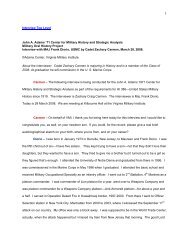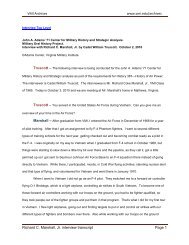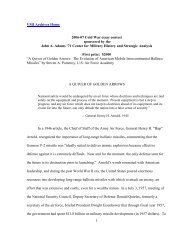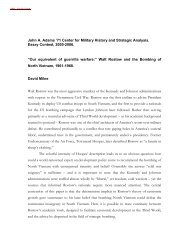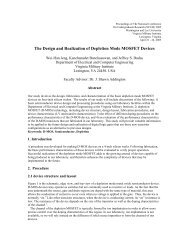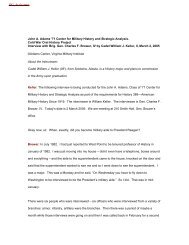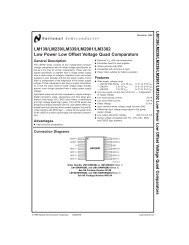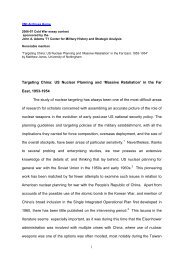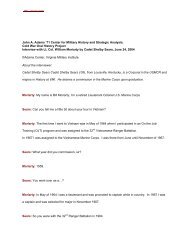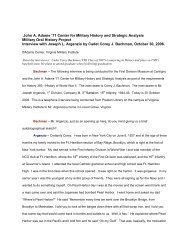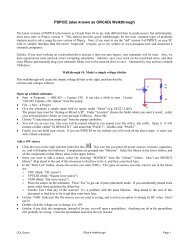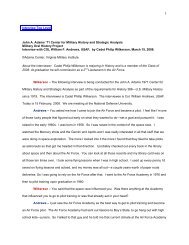Academic Catalog - Virginia Military Institute Admissions
Academic Catalog - Virginia Military Institute Admissions
Academic Catalog - Virginia Military Institute Admissions
Create successful ePaper yourself
Turn your PDF publications into a flip-book with our unique Google optimized e-Paper software.
<strong>Virginia</strong> <strong>Military</strong> <strong>Institute</strong><br />
12-13 <strong>Catalog</strong>ue<br />
GR 307. LITERATURE SURVEY (1100-1700) 3—0—3<br />
Authors and works include: the Nibelungenlied, Hartmann von Aue, Martin Luther, Hans<br />
Sachs, Andreas Gryphius and others. Prerequisite: GR 202.<br />
GR 308. LITERATURE FROM THE ENLIGHTENMENT TO REVOLUTION 3—0—3<br />
This course treats the literature and philosophy of the Enlightenment, classicism (Goethe,<br />
Schiller), romanticism (Kleist, Grimm) and the Zensur that led up to the 1848 revolution.<br />
Prerequisite: GR 202.<br />
GR 316. TOPICS IN GERMAN 3—0—3<br />
A topics course that varies to reflect cadet and professorial interests. The goal of this course<br />
is to provide information and foster discussion of diverse topics from the German-speaking<br />
world and to reinforce the language skills of all cadets enrolled. The language of instruction<br />
is German. Prerequisite: GR 202. Retakes for credit.<br />
GR 405 and GR 406. SEMINAR IN GERMAN LITERATURE 3—0—3<br />
3—0—3<br />
Directed readings of major literary works; written reports and a research paper required.<br />
Taught in German. Prerequisite: permission of the department head. Retakes for credit.<br />
GR 411. VIENNA, BERLIN, AND BETWEEN: GERMANY AND AUSTRIA<br />
FROM 1911-1950 3—0—3<br />
A study of Hermann Hesse, Robert Musil, Ernst von Salomon, Hugo von Hofmannsthal,<br />
among others. This course focuses on how Austrians and Germans saw the world during<br />
the first half of the 20th century. Prerequisite: 6 hours of 300 level German.<br />
GR 412. GERMAN ON BOTH SIDES OF THE IRON CURTAIN 3—0—3<br />
A continuation of GR 411. Students will study the unique situation of the two Germanys<br />
during the Cold War. Emphasis on Heinrich Böll and Ulrich Plenzdorf. Prerequisite: 6 hours<br />
of 300 level German.<br />
GR 413. GERMANY AND THE MILITARY 3—0—3<br />
This course treats depictions of military life and war in literature with emphasis on German<br />
traditions and attitudes. Authors include Erich Maria Remarque and Hans Hellmuth Kirst.<br />
Prerequisite: 6 hours of 300 level German.<br />
GR 420W. ADVANCED CONVERSATION AND COMPOSITION 3—0—3<br />
Students examine, discuss, and debate current events of political and military topics, such<br />
as the restructuring and deployment of the Bundesweht and Germany’s role in the European<br />
Union. E-portfolios will constitute an important part of this course. Prerequisite: 6 hours of<br />
300 level German. Writing Intensive (W).<br />
GR 421. IMMIGRATION TO AND FROM GERMANY SINCE 1850 3—0—3<br />
Readings will focus on immigration to the New World, starting in the 19th century, and the<br />
influx of immigrants to Germany after World War II. Prerequisite: 6 hours of 300 level German.<br />
GR 450. MODERN LANGUAGE CAPSTONE COURSE 3—0—3<br />
The student will choose a topic incorporating an analysis of historical, literary or cultural<br />
factors in the major language area - field experience and interdisciplinary topics are strongly<br />
encouraged. Upon approval of the faculty adviser, the student will prepare both a research<br />
paper and a 20-minute oral presentation. This course is required of all Modern Language<br />
majors and is only open to first and second class Modern Language majors. The ML<br />
Capstone project will be written in the student’s major foreign language, as appropriate, and<br />
it will achieve a language rating of “Advanced-High”. All relevant documentation will adhere<br />
to MLA specifications. An accepted ML Honors Thesis could substitute for this course.<br />
history<br />
DEPARTMENT OF HISTORY<br />
DEPARTMENT head: ColONEl WilkINSON<br />
Requirements for a major in history are specified on pages 57-59.<br />
HI 103. WORLD HISTORY I 3—0—3<br />
A study of the world’s major civilizations prior to 1500, concentrating on their primary values<br />
and institutions, and their cultural contacts. Particular attention devoted to the Middle East,<br />
China, India, the Mediterranean world, and Western Europe.<br />
HI 104. WORLD HISTORY II 3—0—3<br />
A study of the world’s major civilizations since 1500, the rise and expanding influence of<br />
the West, and the interaction between the West and non-West.<br />
HI 200. INTRODUCTION TO HISTORICAL METHODOLOGY 3—0—3<br />
This course develops essential skills for historians such as: critical reading and thinking,<br />
basic research methods and the fundamentals of organizing, writing and documenting history<br />
papers in accordance with the standards of the discipline. Subject matter varies. Required<br />
for majors; restricted to majors. Normally taken in the third year. Note Well: A grade of “C” or<br />
better is required as a pre-requisite to one of the 300-level methodologically intensive courses.<br />
HI 205. HISTORY OF THE UNITED STATES I 3—0—3<br />
A general survey of American history beginning with the Colonial Period and ending with<br />
1877. The approach is broad with attention being given to political, diplomatic, constitutional,<br />
intellectual, social, and economic trends. Required of history majors and minors. May be<br />
taken as a writing-intensive course when offered (205W).<br />
HI 206. HISTORY OF THE UNITED STATES II 3—0—3<br />
A general survey of American history covering the period 1877 to the present. The approach<br />
is broad with attention being given to political, diplomatic, constitutional, intellectual, social,<br />
and economic trends. Required of history majors and minors.<br />
HI 210-299. SPECIAL COURSES 3—0—3<br />
Occasional courses on special topics in history may be offered by visiting faculty members<br />
or by departmental faculty. These courses fulfill regional distribution requirements if their<br />
regional category is included in the course announcement before registration.<br />
HI 225. HISTORICAL METHODS. IRAN: PAST AND PRESENT 3—0—3<br />
This is a laboratory course that introduces history majors to the basic sources, methods<br />
and skills necessary for writing history. The class is designed to guide mainly third classmen<br />
through the process of conducting historical research, including finding and analyzing sources<br />
and engaging with them critically, and presenting their results clearly and effectively. Topics<br />
from Iranian history of different periods are used as historical material for students to work<br />
on and experiment with. Region: Africa/Asia/Latin America.<br />
HI 301. ANCIENT EGYPT 3—0—3<br />
An upper-level survey course covering the history of Egypt from the predynastic period<br />
through the Roman occupation. Region: Africa/Asia/Latin America.<br />
HI 302. ANCIENT GREECE 3—0—3<br />
An upper-level survey course which covers the Greek world from the Trojan War to the<br />
death of Cleopatra. Region: Europe or Africa/Asia/Latin America, but not both.<br />
HI 303. ANCIENT ROME 3—0—3<br />
An upper-level survey course which covers the Roman world from the early Iron Age<br />
settlements in Italy to Rome’s conquest of the Mediterranean and the fall of the empire.<br />
Region: Europe or Africa/Asia/Latin America, but not both.<br />
HI 304. THE MEDIEVAL WORLD 3—0—3<br />
An upper-level survey of eastern and western Europe from the fall of Rome to the eve of<br />
the Renaissance, and Islam as it impacts on these areas. Region: Europe or Africa/Asia/Latin<br />
America. May be writing intensive when offered as HI 454W.<br />
HI 307. ENGLISH HISTORY I 3—0—3<br />
A study of English history from Stonehenge to the Glorious Revolution of 1688. The focus is<br />
on social, cultural, and constitutional history, as they illuminate political trends. Region: Europe.<br />
HI 308. ENGLISH HISTORY II 3—0—3<br />
A study of English history from 1688 to the present. The focus is on England’s transition to<br />
an industrial democracy without a revolution, Victorianism, and the rise to global influence<br />
and subsequent decline. Region: Europe.<br />
HI 309. HISTORY OF THE HOLOCAUST 3—0—3<br />
A study of the causes, events, and results of the Nazi attempt to destroy the Jews of<br />
Europe. Topics to be considered are: the history of the Jewish people; the causes and<br />
history of anti-Semitism; the Nazi rise to power and persecution of the Jews; the actions<br />
and motives of Holocaust perpetrators, victims, and bystanders; and the impact of the<br />
Holocaust on contemporary history. May be offered as a writing intensive course (309W) at<br />
the Instructor’s discretion. Region: Europe.<br />
HI 310X. WAR AND SOCIETY IN MODERN CHINA 3—0—3<br />
This course introduces cadets to the 30-year cycle of civil war and international conflict that<br />
China experienced from the 1920s until the Communist victory of 1949. Major topics include<br />
warlords, imperialism, the Sino-Japanese wars of the 1930s, World War II in China and the<br />
Communist victory in China’s civil war. We will study not only the experience of the war for<br />
combatants and citizens, but also the domestic and international causes and ramifications<br />
of conflict. Prerequisite: HI 104. Region: Asia/Africa/Latin America. Civilizations and Cultures (X).<br />
HI 313. THE UNITED STATES, 1900-1945 3—0—3<br />
A comprehensive study of the United States during the Progressive Era, World War I, the<br />
1920s, and the Great Depression. Region: United States.<br />
HI 314. THE UNITED STATES SINCE 1945 3—0—3<br />
A comprehensive study of the United States from World War II through recent years.<br />
Region: United States.<br />
HI 315. THE HISTORY OF EVERYDAY LIFE 3—0—3<br />
Social history is an approach to the past which deemphasizes the study of “famous men,<br />
great ideas, and big events” in favor of description and analysis of the lives of ordinary people<br />
of the past and the social and economic structures which shaped their lives. This course<br />
introduces students to sources and methods for the study of “history from the bottom up”<br />
and focuses on topics such as family life, courtship and marriage, sex and death, patterns<br />
of work and leisure, gender relations, childhood and youth, and old age. Region: Europe or<br />
United States, but not both. Methodologically intensive.<br />
93





